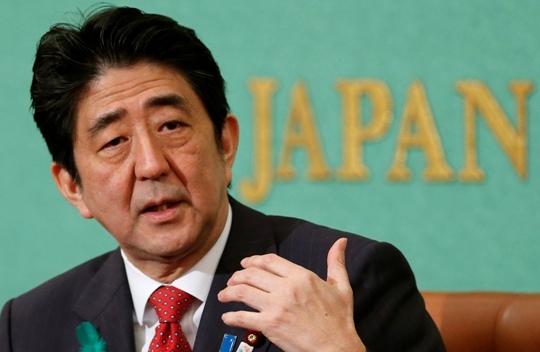The Korean government on Thursday called in the Japanese ambassador to protest Prime Minister Shinzo Abe’s remarks glorifying the country’s imperial past and denying wartime violence.
Vice Foreign Minister Kim Kyou-hyun expressed to Koro Bessho “deep regrets about the Japanese government, and of politicians’ distorted historical understanding and retrospective remarks.
 |
First Vice Foreign Minister Kim Kyou-hyun (right) meets Japanese Ambassador Koro Bessho at the Foreign Ministry Thursday to express regret over Japan’s Prime Minister Shinzo Abe’s controversial remarks and Tokyo officials’ visits to Yasukuni Shrine. (Ahn Hoon/The Korea Herald) |
“We do not understand why the Japanese society, while it so greatly cherishes honesty and trust internally, shuts its eyes and plugs its ears to the country’s history of invasion and colonial rule,” Kim told the envoy in an unusually stringent tone.
“We sincerely hope that Japan will squarely reflect its past and colonial rule with a humble attitude in consideration of the enormous pain and abuse it caused to us, and from there it will correct today’s wrong perception and customs."
The volatile relationship is rapidly cooling once again between the two countries after Tokyo’s top brass relayed visits to a controversial war shrine and churned out remarks denying the country’s wartime atrocities over the weekend.
Seoul’s Foreign Minister Yun Byung-se shelved his first trip to Tokyo since taking office in protest against a visit to Yasukuni Shrine by Deputy Premier and Finance Minister Taro Aso and other Cabinet ministers.
The temple venerates Japanese war dead including World War II leaders responsible for massacres, sex slavery, forced labor and other crimes.
Adding fuel to the flame, Abe told a parliamentary session Tuesday that the definition of invasion varies wildly by country, apparently legitimizing his country’s colonization of the Korean Peninsula in 1910-45 and incursion into China during World War II.
He went further on Wednesday by sheltering the worshippers, saying “my Cabinet members have the freedom to resist any threat.
“It’s a natural thing to express respect and reverence for those who devoted their noble lives for the country,” Abe told the upper house’s budget committee.
 |
Shinzo Abe (AP-Yonhap News) |
Amid the growing furor, the ruling Saenuri Party said Wednesday that it is planning to push for a resolution condemning the Abe administration’s moves.
President Park Geun-hye also called on Japan to “think deeply and carefully,” warning its accelerating swing to the right may strain its relations with other neighbors including China.
“It’s difficult to move toward a future-oriented relationship if it is not based on a correct historical understanding so that past wounds get infected,” she told senior journalists.
Though Park set a better mood with Japan as one of her key national tasks, their relationship has already suffered a series of setbacks this year.
Last month, Seoul protested Tokyo’s approval of newly updated schoolbooks repeating its claim to Dokdo and distorting wartime cruelty. In February, the Japanese government sent a vice minister-level official to the local Takeshima (Dokdo) Day for the first time and unveiled a plan to open a new state body responsible for territorial sovereignty policies, triggering criticism from Korea and China.
With Abe bracing for a pivotal election for the upper house in July, concerns are rising that Tokyo’s rightward shift may deepen historical and territorial brawls with Seoul.
During his first premiership in 2006-07, Abe refrained from worshipping at the shrine in consideration of relations with Korea, a move he later called a “mistake.”
He has also displayed his desire to rewrite the country’s pacifist constitution so it can boost defense spending, expand the use of its Self Defense Forces, reinforce territorial claims and revise a landmark 1993 apology for wartime atrocities.
The two countries’ ties plunged to their lowest ebb in decades after former President Lee Myung-bak visited the Dokdo islets claimed by Tokyo in October, followed by Seoul’s last-minute cancelation of the first bilateral military accord in May.
By Shin Hyon-hee
(heeshin@heraldcorp.com)









